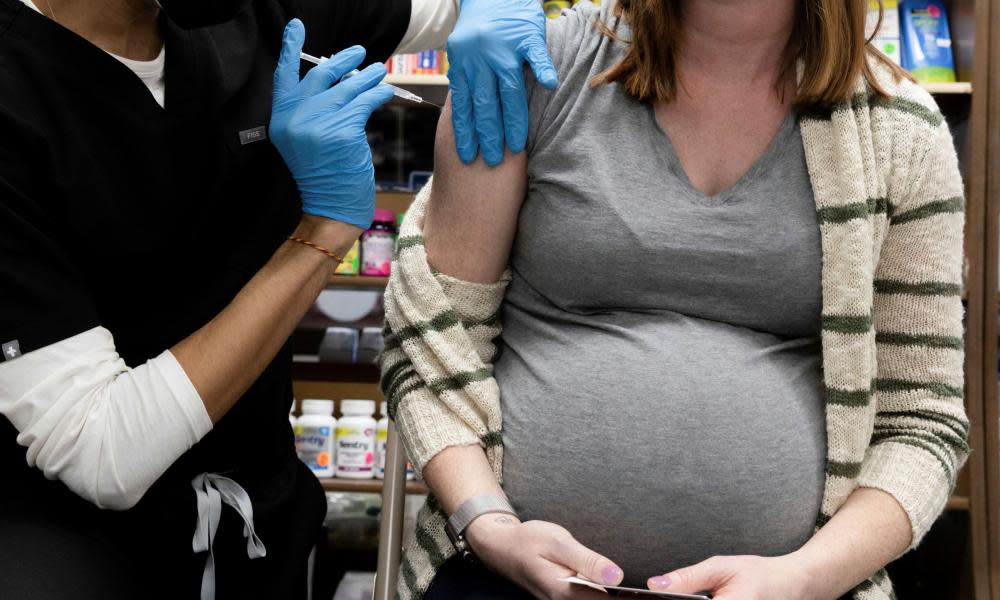Covid vaccinations lag among pregnant Americans amid surge in cases

For many people, the thin red line on a pregnancy test ushers in countless changes. You change what you eat and drink, how you exercise and socialize and sleep, and keep careful track of what medications you should and shouldn’t take.
But for many Americans, there’s one choice they largely haven’t made: getting vaccinated.
Related: ‘Pregnancy is a scary time’: four women on getting the Covid vaccine
About 22% of pregnant people in the US have gotten the Covid shots, according to the US Centers for Disease Control and Prevention (CDC), with another 18% who got vaccinated prior to pregnancy.
That means three in five pregnant Americans have no protection provided by vaccination as the country faces an enormous surge in cases.
“One of the most important things you can do as a pregnant person to protect yourself these days, in terms of the pandemic and generally, is to get vaccinated against Covid-19,” said Neel Shah, chief medical officer of Maven clinic and assistant professor of obstetrics at Harvard Medical School. “And yet, that’s not what we’re seeing.”
In fact, studies show that pregnant people risk more severe disease with Covid-19, and the illness frequently leads to a bevy of complications – including preeclampsia and premature birth.
If you have Covid-19 during pregnancy, you are two to three times more likely to have premature birth, fetal growth restrictions, and hemorrhaging, according to a new study published on Monday in the Journal of Infectious Diseases.
A Covid-19 diagnosis increased the risk of having a very premature baby by 60%, according to another study. These early births are particularly alarming because they “carry the highest risks of infant mortality and adverse outcomes”, the authors wrote, and the babies tend to face longer stays in the neonatal ICU with more severe illness.
People who were Covid-positive when they delivered their babies were twice as likely to have stillbirths, a study from the CDC study found.
And pregnant women with Covid were 22 times more likely to die than women without the illness, according to a study in 18 countries before vaccines were available.
“The maternal mortality rate in our country has gone up year after year, and it’s expected to continue to go up in part because of the pandemic,” Shah said.
In New York last week, Tsion Firew, a physician and assistant professor of emergency medicine at Columbia University, cared for pregnant women with Covid-19 in the emergency room. They were unvaccinated and their fevers soared, their bodies ached and their oxygen levels dropped.
None of these patients needed to be admitted to the intensive care unit, but that’s happened during previous surges. “We’ve seen many unvaccinated women ending up in the ICU, going into cardiac arrest, or having severe hypoxia and needing to be intubated,” she said. And that can cause the babies to be born early, facing their own illnesses and complications.
But Firew understands why many parents-to-be are hesitant about vaccination.
“They’re worried – they don’t know what might happen to their unborn baby with the vaccine,” she said.
She was hesitant at first, too, when the vaccines became available a year ago. Firew was 22 weeks pregnant, and she was concerned that pregnant people weren’t included in the clinical trials. After speaking with her doctor and looking into the data, though, she saw that some people in the trial had become pregnant and carried those pregnancies safely.
She got the vaccine, and she’s glad she could protect herself and her baby – including by passing antibodies from the vaccine first during pregnancy and then through breast milk, which contains helpful antibodies and T-cells.
Firew’s baby, now almost a year old, cooed in the background happily as his mother spoke.
The surge in cases makes it all the more urgent that everyone who is eligible get vaccinated, Firew said. “Now that we have a new variant that’s spreading like a wildfire, everyone is at higher risk compared to prior ones. When you have so many risks that are threatening you, I think it’s important to be protected by vaccination and all the other [precautions].”
Yet there are many reasons why hesitations linger.
Shah’s company conducted a survey of 500 people across the country on their reasons for not getting vaccinated. The biggest reason was that they didn’t realize vaccines – and now boosters – are recommended during pregnancy.
“The public health messaging was really pretty muddled,” Shah said.
And some respondents said their close friends and families, and even some medical providers, had recommended against the shots.
“It wasn’t just that it was ambiguous information,” Shah said. “They were being told that they should not get vaccinated, and in many cases from trusted sources.”
Simply encouraging pregnant patients to get vaccinated is often not enough. They need to have questions answered, especially around the safety of the vaccines.
According to a poll by the Kaiser Family Foundation, six out of 10 respondents who haven’t yet gotten the vaccines worried about their safety, despite an abundance of data showing the vaccines are safe and effective.
“It can’t just be like, ‘You need to do this.’ We need to provide people with a basis for why it’s safe,” Shah said. “People are sort of struggling and anxious at baseline, and then don’t have that clarity.”
Boosters are also an important tool for protecting pregnant people, especially with the winter wave that is gaining force.
“With Omicron in the mix in particular, it seems very, very clear that there is an enormous protective benefit to getting a third vaccine,” Shah said. “Given those stakes and given those risks, again, the most important thing they can do to protect themselves is to get vaccinated.”

